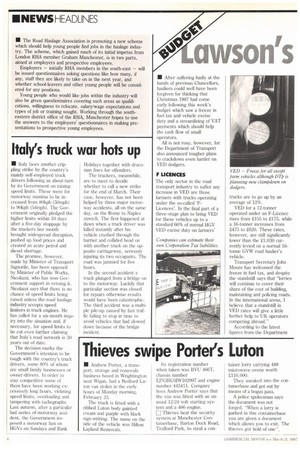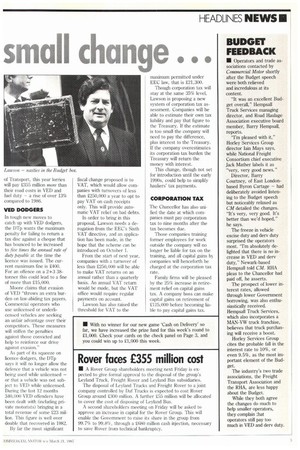ofawson's
Page 6

Page 7

If you've noticed an error in this article please click here to report it so we can fix it.
small change • • •
• After suffering badly at the hands of previous Chancellors, hauliers could well have been forgiven for thinking that Christmas 1987 had come early following this week's budget which saw a freeze in fuel tax and vehicle excise duty and a streamlining of VAT payments which should help the cash flow of small operators.
All is not rosy, however, for the Department of Transport also announced tougher plans to crackdown even harder on VED dodgers.
F UCENCES The only sector in the road transport industry to suffer any increase in VED are those farmers with trucks operating under the so-called 'FLicences'. In the final part of a three-stage plan to bring VED for these vehicles up to a standard 60% of normal HGV VED excise duty on farmers' trucks are to go up by an average of 12%.
VED for a 12-tonner operated under an F-Licence rises from £155 to 2175, while a 16-tonner increases from 2475 to £620. These rates, however, are still significantly lower than the £1,030 currently levied on a normal 16tonne GVW road haulier's vehicle.
Transport Secretary John Moore has welcomed the freeze in fuel tax, and despite the standstill says that "lorries will continue to cover their share of the cost of building, maintaining and policing roads. In the international arena, I believe that a standstill in VED rates will give a little further help to UK operators competing abroad."
According to the latest figures from the Department
of Transport, this year lorries will pay 2355 million more than their road costs in VED and fuel duty — a rise of over 13% compared to 1986.
VED DODGERS In tough new moves to
catch up with VED dodgers, the DTp wants the maximum penalty for failing to return a tax disc against a cheque that has bounced to be increased to five times the annual rate of duty payable at the time the licence was issued. The current maximum fine is £400. For an offence on a 2+3 38tonner this could lead to a fine of more than £15,000.
Moore claims that evasion of VED "throws an extra burden on law-abiding tax payers. Commercial operators who use unlicensed or underlicensed vehicles are seeking an unfair advantage over their competitors. These measures will stiffen the penalties against those convicted and help to reinforce our drive against evasion."
As part of its squeeze on licence dodgers, the DTp says it will no longer allow the defence that a vehicle was not being used while unlicensed — or that a vehicle was not subject to VED while unlicensed. During the last 12 months 340,000 VED offenders have been dealt with (including private motorists) bringing in a total revenue of some £23 million. This figure is well over double that recovered in 1982.
By far the most significant fiscal change proposed is to VAT, which would allow companies with turnovers of less than £250,000 a year to opt to pay VAT on cash receipts only. This will provide automatic VAT relief on bad debts.
In order to bring in this proposal, Lawson needs a derogation from the EEC's Sixth VAT directive, and an application has been made, in the hope that the scheme can be introduced on October 1.
From the start of next year, companies with a turnover of less than £250,000 will be able to make VAT returns on an annual rather than a quarterly basis. An annual VAT return would he made, but the VAT office would require regular payments on account Lawson has also raised the threshold for VAT to the maximum permitted under EEC law, that is £21,300.
Though corporation tax will stay at the same 35% level, Lawson is proposing a new system of corporation tax assessment. Companies will be able to estimate their own tax liability and pay that figure to the Treasury. If the estimate is too small the company will need to pay the difference, plus interest to the Treasury. If the company overestimates its corporation tax burden the Treasury will return the money with interest.
This change, though not set for introduction until the early 1990s, could help to simplify hauliers' tax payments.
CORPORATION TAX The Chancellor has also unified the date at which companies must pay corporation tax to nine months after the tax becomes due.
Those companies training former employees for work outside the company will no longer be liable for tax on the training, and all capital gains companies will henceforth be charged at the corporation tax rate.
Family firms will be pleased by the 25% increase in retirement relief on capital gains tax. A company boss can make capital gains on retirement of £125,000 before becoming liable to pay capital gains tax.




















































































